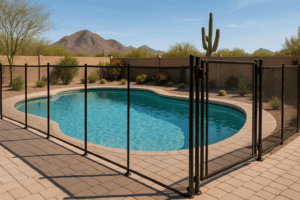Owning a pool comes with the joy of swimming right in your backyard, but it also brings responsibilities that can seem overwhelming. That’s where our guide comes into play—letting you navigate pool fence regulations with ease. Designed specifically for homeowners like you, this blog aims to offer clarity and peace of mind.
Contents
- 1 Understanding the Basics of Pool Fencing
- 2 Legal Requirements You Can’t Ignore
- 3 Materials Matter: Choosing the Right Fence
- 4 The Role of Professional Installation
- 5 Common Mistakes to Avoid
- 6 How Often Should You Inspect Your Fence?
- 7 Understanding Costs and Budgeting
- 8 Maintenance Tips for Longevity
- 9 Regulations for Special Circumstances
- 10 Benefits Beyond Compliance
- 11 Conclusion
Understanding the Basics of Pool Fencing
When it comes to pool fencing, safety is the first priority. It’s crucial for preventing accidents and ensuring that your pool area is secure. Most importantly, it helps protect children and pets from unsupervised access to the pool.
There are specific guidelines that every homeowner should follow. These rules are not just suggestions; they’re legal requirements. By understanding and adhering to these regulations, we’re taking a big step toward creating a safer home environment.
Legal Requirements You Can’t Ignore
Governments and local authorities have set specific criteria that every pool fence must meet. First and foremost, the fence heights are usually mandated by local legislation. Ensuring your fence is tall enough can prevent easy access by children.
Besides height, the gates need to self-close and self-latch. This automatic mechanism ensures maximum security even in moments of forgetfulness. Ignoring these legal requirements can not only risk safety but can also result in heavy fines.
Materials Matter: Choosing the Right Fence
Selecting the right materials for your pool fence can make a huge difference in durability and safety. Iron and aluminum offer robust protection and are favored for their strength and aesthetic appeal. However, other options like mesh and glass provide visibility and a modern look.
Every material has its pros and cons, and the choice largely depends on your specific needs and budget. Consulting us before you make a decision can help guide your choice to ensure compliance and style.
The Role of Professional Installation
Installing a pool fence may seem like a straightforward task, but it’s more complex than it appears. Professionals are well-versed in local laws and will ensure that each aspect of the installation is compliant. A poorly installed fence can do more harm than good, undermining the security it is meant to provide.
Moreover, professional installation often comes with warranties and guarantees, providing you with added peace of mind. A correctly installed fence helps avoid unwanted complications and ensures a long life for your pool area security setup.
Common Mistakes to Avoid
Many homeowners make mistakes during the fence installation process that could easily be avoided with a bit more information. Failing to check local laws can result in an incorrect fence height, which would lead to unnecessary expenses for adjustments.
Another common error is neglecting gate maintenance. Even a minor issue like a faulty latch can become a significant safety hazard. Regular checks can head off potential problems before they escalate.
How Often Should You Inspect Your Fence?
Routine checks are critical for maintaining the security of your pool fence. Most experts recommend that you inspect your fence at least once every six months. During these inspections, pay close attention to the gate’s functionality and the condition of the materials.
In addition to these routine checks, always be vigilant after extreme weather as damage is more likely to occur. An immediate inspection following severe storms or high winds can prevent problems before they become dangerous.
Understanding Costs and Budgeting
Budgeting for a pool fence involves more than just the cost of materials. Labor costs and possible permit fees also add to the final expense. It’s best to budget for both the installation cost and future maintenance needs.
Keep in mind that investing in a high-quality fence now can save you money in the long run. A robust, well-installed fence requires fewer repairs and involves fewer headaches down the road.
Maintenance Tips for Longevity
Proper maintenance is key to getting the most out of your pool fence. Simple tasks like cleaning the fence regularly can go a long way. Use soap and water to wipe away dirt and debris that can cause corrosion or wear over time.
Additionally, it’s crucial to lubricate hinges and latches periodically. This minor upkeep can prevent rust and ensure that your fence remains functional and secure.
Regulations for Special Circumstances
Every home is unique, and sometimes special circumstances require additional considerations. For example, if your property is situated near a public area, there might be additional privacy requirements for your fence.
Understanding these special regulations not only helps in meeting the legal standards but also in enhancing privacy and security. It’s always a good idea to consult with experts like us when dealing with these specific situations to ensure compliance.
Benefits Beyond Compliance
- Safety: A pool fence dramatically reduces the risk of accidental drownings, giving homeowners peace of mind.
- Legal Compliance: Meeting local regulations prevents legal issues and potential fines.
- Property Value: A well-designed fence can enhance the aesthetic appeal and value of your home.
- Privacy: It can provide an extra level of privacy, making your backyard a more enjoyable space.
- Child and Pet Protection: Ensuring that young ones and pets don’t wander into the pool area unsupervised.
Conclusion
Investing time in understanding and implementing pool fence regulations is a vital step in ensuring safety and compliance. For more personalized assistance, connect with us by phone at #480-771-8026 or Request a Free Quote today.




